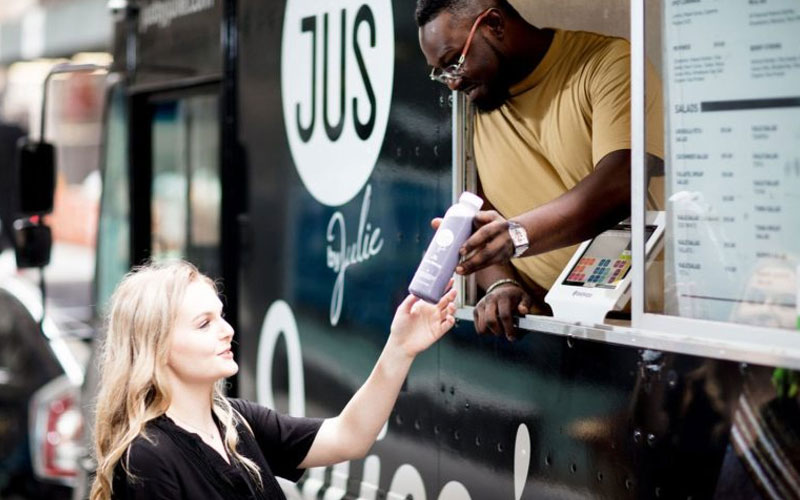
What foodie hasn’t dreamt of trading in their nine to five toil for the culinary ambitions of setting up shop with an Instagram-worthy food truck? If you just felt butterflies in your gut, it’s probably your die-hard enthusiasm getting the best of you and not a sign that it’s time for lunch. If thinking and pondering how much it costs to start a food truck is holding you back from your dreams, hesitate no longer. We’ve done the research and put in the sweat equity for you. Since no small business owner should jump into a $1.2 billion industry blind, we put together a handy reference guide, so you know exactly what to expect.
Since food trucks are essentially micro-restaurants on wheels, you might assume that launching a food truck business is going to cost you only a fraction of that of a traditional brick-and-mortar full-service restaurant. To a certain extent, you’re correct. But that doesn’t mean that rolling down Main Street for lunch hour in your new set of shiny wheels is going to be cheap. When starting a mobile operation, costs are going to vary (just like for any restaurant), but you can expect to pay between $28,000 and $114,000. When all’s said and done, what end of that spectrum you land on will depend on a variety of factors. Below are a few to consider.
- Writing a business plan
- Food truck vehicle costs
- Food and other supplies
- Insurance for the food truck
- Licenses, permits and certifications
- Food truck parking
- Marketing your food truck
- Hiring and training employees
- Putting money back into your pocket
Riding the food truck wave?
Don't miss out on these key steps before opening your restaurant! Check out the must-do items for a successful grand opening.
Writing a business plan
First things first, the food truck industry is incredibly competitive. What started as a gold rush for ambitious entrepreneurs has evolved into a more mature market. Experienced restaurateurs are flocking to space to get their slice of the pie, and even use food trucks as a tool for promoting their core brick-and-mortar restaurants.
To maximize your chance of succeeding against this level of competition, you’ll need to do a significant amount of planning. It’s essential to understand your market and the unique value you’re delivering, as well as the nuts and bolts of financing, insuring and licensing your operation. The best way to do that is by creating a traditional business plan.
If you do it yourself, the main cost is your time, but if this is your first business venture, you might want to pay an expert to write the plan and consult on any legal and tax requirements you’ll need to comply with. The costs here can range from a few hundred dollars to several thousand, depending on the sophistication of your operation and the amount of work you need done.
Food truck vehicle costs
It’s the most obvious of food truck startup costs. But regardless, the cost of purchasing your actual truck needs to be addressed. Like all vehicles, prices will vary. You’re going to come across the brand spanking new Lamborghini of food trucks, as well as your garden variety 1985 jalopies. Depending on whether you go the new or used route, the price of a food truck will run you anywhere from $50,000 to $200,000. Remember, this also doesn’t include the cost of decorating and outfitting the truck—such as designing and applying a truck wrap, as well as adding any additional stoves, fryers, refrigerators or other restaurant equipment your specialty food might call for. So if you’re unsure about dropping $200K on a truck, we recommend aiming for the lower end and then outfitting as needed.
You may even want to consider opening up a food cart, coffee truck or concession business rather than an actual food truck, if your specialty food allows for this type of setup. Think of a food cart or trailer as the equivalent to a pop-up store for a brick-and-mortar retailer. The start-up cost would be less and the regulations around operations for a food cart may not be as strict as they would be for a food truck.
It’s also a smart idea to talk to other food truck owners and get their perspective when it comes to buying a truck for your mobile food business. They may have an old one they’re willing to sell, rent or lease to you. Plus, they may have connections to other truck owners that might be selling their truck.
Lastly, keep in mind that bigger may not always be better. Not only will a bigger truck typically cost more, but if yours weighs over 26,000 pounds, you will be required to have a commercial driver license to even drive it; and that can cost anywhere from $100–$300 for the state licensing in the United States and up to a $1000–$3000 if you’re going to throw in the added cost of commercial driver lessons to ensure you can pass a CDL road test.

Food and other supplies
You’ll also need to dedicate some of your startup capital towards buying the food and supplies you need to make and serve your dishes. Restaurant experts claim that your food costs should be 28%–35% of the price you sell the product for. So, if you sell a taco for $1.00, your food cost for that taco should be $0.28–$0.35 otherwise you risk running into cash flow issues in the future.
Insurance for the food truck (and business)
You heard correctly, just like for any small (or large) business, you must insure, insure, insure. Expect insurance costs for starting up your food truck to run your business about $300 and up, annually. You’ll want to make sure your food truck is covered for everything from general liability insurance to auto accidents, and foodborne illness to workers’ compensation insurance for you and your employees. Make sure to reach out to an insurance expert for advice regarding which insurance works best for your business.
Licenses, permits and certifications—oh my!
We can’t talk about how much it costs to start a food truck, without talking about the licenses, permits and certifications you’re going to need in order to operate your food truck business. Besides the health department, you will have to jump through a few hoops to obtain the proper permits, but you’ll also have to pay to file for them. When outlining your food truck business plan, these items should be factored in as part of your startup cost and recurring cost, depending on how often you need to renew.
This is a tricky topic because the rules, regulations and cost vary from one state and province to the next and even from one city or county to the next. The best advice we can give you here is, once you have an idea of what corner of the street you want to operate, make sure you check with all local (state, city, county, borough, township etc…) jurisdictions so that you obtain the proper licensing.
On the brighter side, due to the popularity of food truck vendors, a lot of these laws, regulations and ordinances are becoming more relaxed—making it easier for food truck vendors to do business in their city.
Can you park anywhere with a food truck?
Here’s one you’ve probably never thought of before. Where can I park my food truck? And we’re not just talking about where you can park it during business hours, but also where are you going to park your food truck during off-hours?
It’s no surprise that the largest food truck populations are in states that are home to some of the biggest cities in the U.S.—California and New York are ranked number #1 and #2. So, chances are, if you’re a food truck owner or thinking about investing in a food truck business, you likely live in or near a populated urban city. For you, this means that regulations are higher and space comes at a premium. Here’s what you need to consider.
Food truck parking during business hours
Since space is at such a premium in larger cities, the regulations for using said space are usually governed more rigidly than they would be in a less populated area.
Once you’ve scouted a prime location for your food truck, make sure you check with all local jurisdictions about what type of permits and licenses you need to operate, but also what’s required to have it parked. Does the space require a special lease? What are the terms of the lease and is it transferable?
Food truck parking during off-hours
Once you’ve closed up truck for the day, where do you park it? If you live in the suburbs, maybe you have your own driveway where you can park the food truck at night. Which is great, because there is no additional cost to you. If you aren’t so lucky, you may have to rent or lease a space to park your food truck during non-business hours, and that can add up to a few hundred dollars per month.
Event parking
We’re going to park this one right here because food truck events will usually cost you some green. Finding a prime location for your everyday operations is crucial to the success of your restaurant on wheels, but so is your participation in food truck events—or events that have a food truck component like the Food Truck Village at Belmont Stakes Racing Festival. Your participation at these types of events will usually cost $200–$1000 just to attend, and some may also want a percentage of your sales. Make sure you read the fine print before you commit.
Fuel to keep you rolling
Another recurring cost to bear in mind is that of gas. Like many of your food truck startup costs, the cost of fuel will vary depending on the size of your truck, how much you drive, where you fill up, and any additional equipment you might use like generators. Expect to shell out between $250 and $500 monthly to keep your wheels turning and the profits coming.
POS system to keep lines moving (and customers happy)
Fast-moving lines equal content customers, while content customers equal repeat business. Back in the day, food trucks were cash-only businesses. That is no longer the case, and that’s a good thing. As the popularity of mobile payments increases, people are increasingly starting to carry less and less cash on them. With the growing cashless trend, food trucks are recognizing that accepting cards and mobile payments have the potential to grow their profits exponentially. But to do this, you are going to need to invest in a POS system. A POS system will not truly let you accept mobile payments, but it will also help you take care of the many day-to-day operations of running your food truck such as handling transactions, handling customer information and running reports.
Marketing your food truck business
With the level of competition you’ll be facing, your marketing needs to be on its A-game. For many food trucks, this means focusing on a killer social media presence and tasteful email marketing.
The food industry is highly visual, so marketing on a platform like Instagram makes a ton of sense. Your first priority should be to create and share stunning images of your food, but you can do far more than that. Show off your truck’s branding, take advantage of user-generated content, take photographs of customers crowding around your truck and even share some behind-the-scenes shots. For example, Instagram’s Stories feature is a great way to show the various stages involved in the preparation of a dish.
Since you’re likely to park your food truck at different locations throughout the day and week, you’ll also want to share that kind of information in real-time. Twitter and Facebook are great tools for providing this kind of quick update. They’re also powerful tools for providing more general updates to your fans. For example, if you’re going to be at a food truck gathering/festival later in the month, you can create a Facebook event and invite your fans to attend.
Lastly, you won’t want to overlook the power of email marketing. There’s no better way to communicate with a customer on a 1:1 basis than email. While marketing is both powerful and essential, it isn’t free. These are some of the costs you might have to account for:
- Your time to manage your marketing platforms or a part-time marketing hire: $10 – $25 per hour
- Custom designed email templates: $100+
- Email marketing platform subscription: $10 – $200+ per month
One good piece of news is that some email marketing platforms offer a free version of their software that you can use when you’re just starting out and your list is small. Most will also include free design templates to help you get started.
Hiring and training employees
We know that hiring employees might not be the first thing on your mind when you throw open the windows to your brand new truck, but it’s definitely something you need to keep in mind and budget for accordingly. Ideally, you want your business to grow and prosper. What that will look like is longer lines, more orders and increased revenue. All of a sudden, the length of your lunch hour line might double, and you are going to need help (i.e. a paid employee) to help you take orders, stuff the tacos and ring up sales.
Depending on the size of your truck and the length of your line, you might want to start with more than one employee. You’ll also want to find employees with previous food truck or restaurant experience. This can help you accelerate your learning curve and deliver the quality service your customers will love. Regardless of the size of your staff, however, expect to pay between $8 and $15 per hour for each employee.
Outside of the time and cost of finding and hiring staff, there are a few additional costs you’ll want to consider. For example, if you want your employees to wear uniforms—whether it’s something simple like a t-shirt or apron, or something more elaborate—you’ll need to buy those. Additionally, depending on your state or province, your employees may need to undergo food safety training and even acquire a food handlers certification.
The costs related to these items can vary significantly, based on how you want to run your business, as well as where you operate.
Put money back in your pocket
While there are a lot of costs that go into starting a mobile food truck business, it’s also an opportunity for you to turn the tables and make a few dollars advertising.
That’s right, as the truck owner, you can carve out a small section of real estate on your truck to use as advertisement space. Find another local business that would be a compliment to yours, or one that is also relevant to your target demographic, and sell some advertising space. You can negotiate the rate and the term to something that works for both businesses.
Launching your food truck adventure
By no means are these food truck start-up costs all you will need to invest in when starting your food truck business. They are, however, a few of the more costly ones and should be taken into consideration when determining how much it will cost to launch your food truck.
Make sure to do the necessary research prior to embarking on the adventure of a lifetime. Check in with industry experts, food truck owners and local laws to make sure you have all the information you need to kick-start your business.
For all of your food truck point of sale needs, Lightspeed has your back. Talk to one of our experts to find out how our solutions can best meet your needs.

News you care about. Tips you can use.
Everything your business needs to grow, delivered straight to your inbox.



